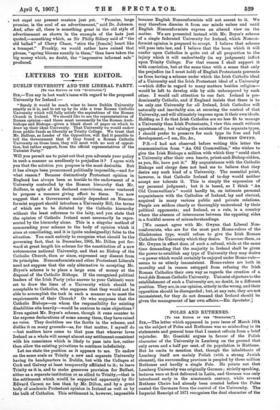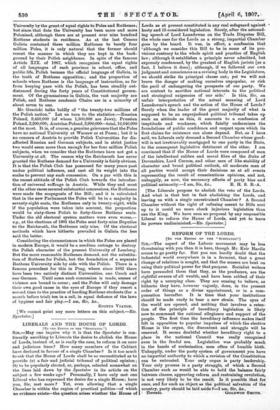POLES AND RUTHENES..
[To TIM EDITOR OF THII "SPECTATOR:I Sin,—The letter which appeared in your issue of March 16th on the subject of Poles and Ruthenes was so misleading in its statements and general tone that I cannot refrain from a brief rejoinder. Mr. Goscicki argues in favour of the Polish character of the University in Lemberg on the ground that only seven and a half per cent of its population is Ruthene. But he omits to mention that, though the inhabitants of Lemberg itself are mainly Polish (with a strong Jewish element), the surrounding province is peopled by three million Ruthenes and hardly a single Polo. He points out that Lemberg University was originally German ; strictly speaking, lectures were at first delivered in Latin, and German was only introduced early in the nineteenth century, while several Ruthene Chairs had already been created before the Poles ousted the Germans from the control of the University. The Imperial Rescript of 1871 recognises the dual character of the
University by the grant of equal rights to Poles and Ruthenes; but Since that date the University has been more and more Polonised, although there are at present over nine hundred Rutbene students in residence. As at the last Census Galicia contained three million Ruthenes to barely four million Poles, it is only natural that the former should resent the manner in which they are kept in the back- ground by their Polish neighbours. In spite of the famous Article XIX. of 1867. which recognises the equal rights of all languages of each province in school, office, and public life, Polish became the official language of Galicia, in the teeth of Ruthene opposition; and the proportion of schools where Ruthene is the language of instruction, so far from keeping pace with the Polish, has been steadily out- distanced during the forty years of Constitutional govern- ment, Of the gymhasiums in Galicia, the vast majority are Polish, and Ruthene a.cademith Chairs are in a minority of about seven to one.
Mr. Goscicki talks boldly of " the twenty-two millions of the Polish nation." Let us turn to the statistics :—Russian Poland, 9,450,000 (of whom 1,300,009 are Jews); Prussian Poland, 3,200,000; Austrian Poland, 8,990,000—total, 16,640,000 at the most. It is, of course, a genuine grievance that the Poles have no national University at Warsaw or at Posen ; but it is no concern of Austria to provide Polish Universities for dis- affected Russian and German subjects, and in strict justice two would seem more than enough for her four million Polish subjects, when we consider that the Ruthenes have not got a University at all. The reason why the Reichsrath has never granted the Ruthene demand for a University is fairly obvious. It is that the Polish Club has possessed for many years past undue political influence, and cast all its weight into the scales to prevent any such concession. On a par with this is the recent attitude of the Polish Club towards the introduc- tion of universal suffrage in Austria. While they and most of the other races secured substantial concessions, the Ruthenes were made the scapegoats of the Bill; and it is calculated that in the new Parliament the Poles will be in a majority in seventy-eight seats, the Ruthenes only in twenty-eight, while if the population were taken into account, the proportion would be sixty-three Polish to forty-three Ruthene seats. Under the old electoral system matters were even worse,- e.g., at the elections of 1901 the Poles sent forty-nine Deputies to the Reichsrath, the Ruthenes only nine. Of the electoral methods which have hitherto prevailed in Galicia the less said the better.
Considering the circumstances in which the Poles are placed in modern Europe, it would be a needless outrage to destroy the Polish character of the present University of Lemberg. But the more reasonable Ruthenes demand, not the substitu- tion of Ruthene for Polish, but the foundation of a separate Ruthene University side by side with the Polish. There is a famous precedent for this in Prag, where since 1882 there have been two entirely distinct Universities, one Czech and one German. Until some such concession is made, scenes of violence are bound to occur; and the Poles will only damage their own good cause in the eyes of Europe if they resort a second time to the practice of herding Ruthene students (for a month before trial) ten in a cell, in equal defiance of the laws of hygiene and fair am, Sir, &c.,
SCOTUS VIA.TOR.
[We cannot print any more letters on this subject. —ED. Spectator.]











































 Previous page
Previous page